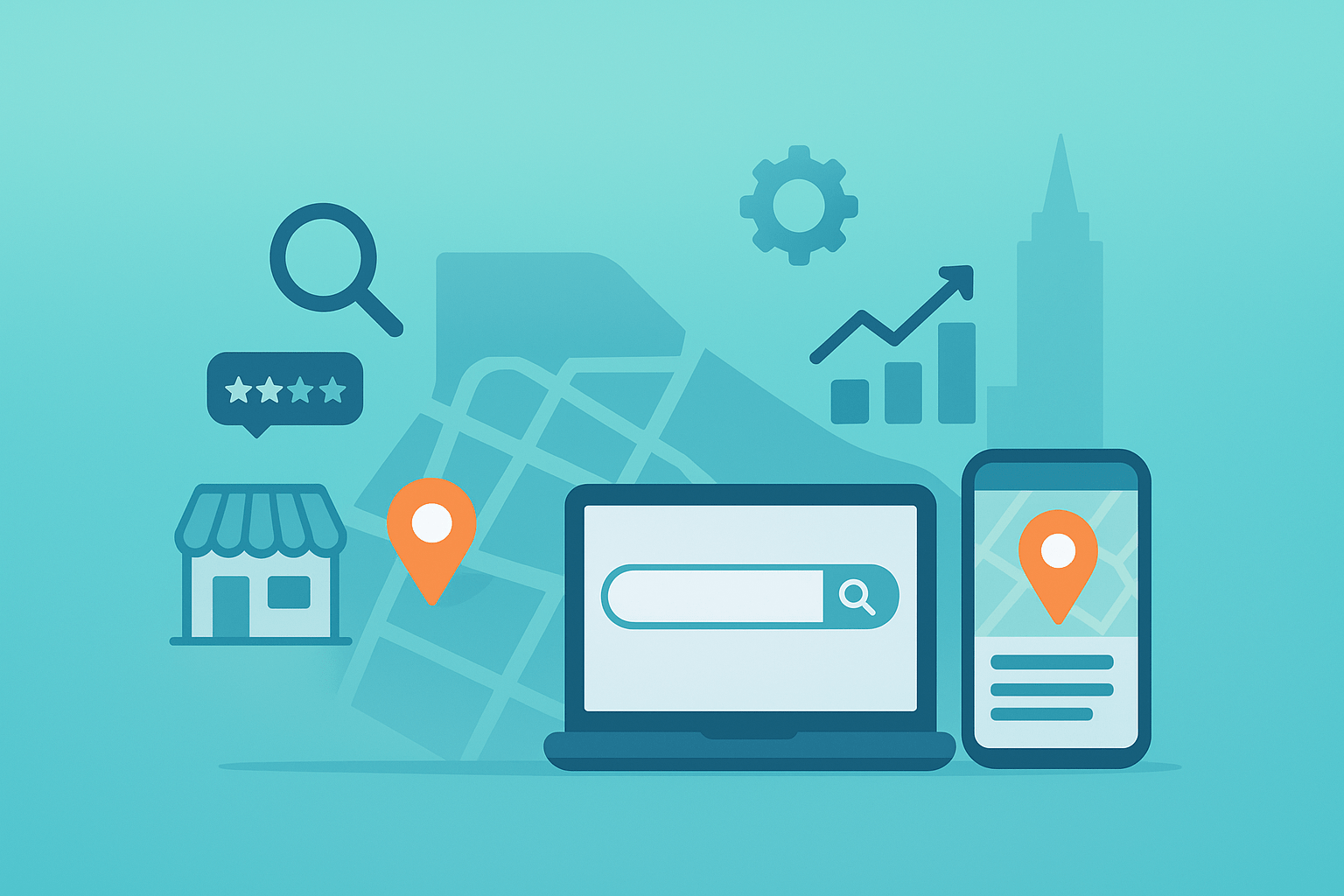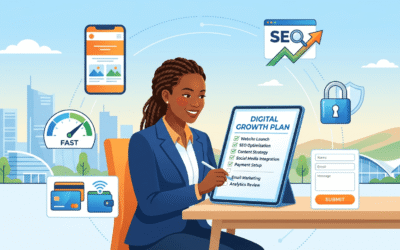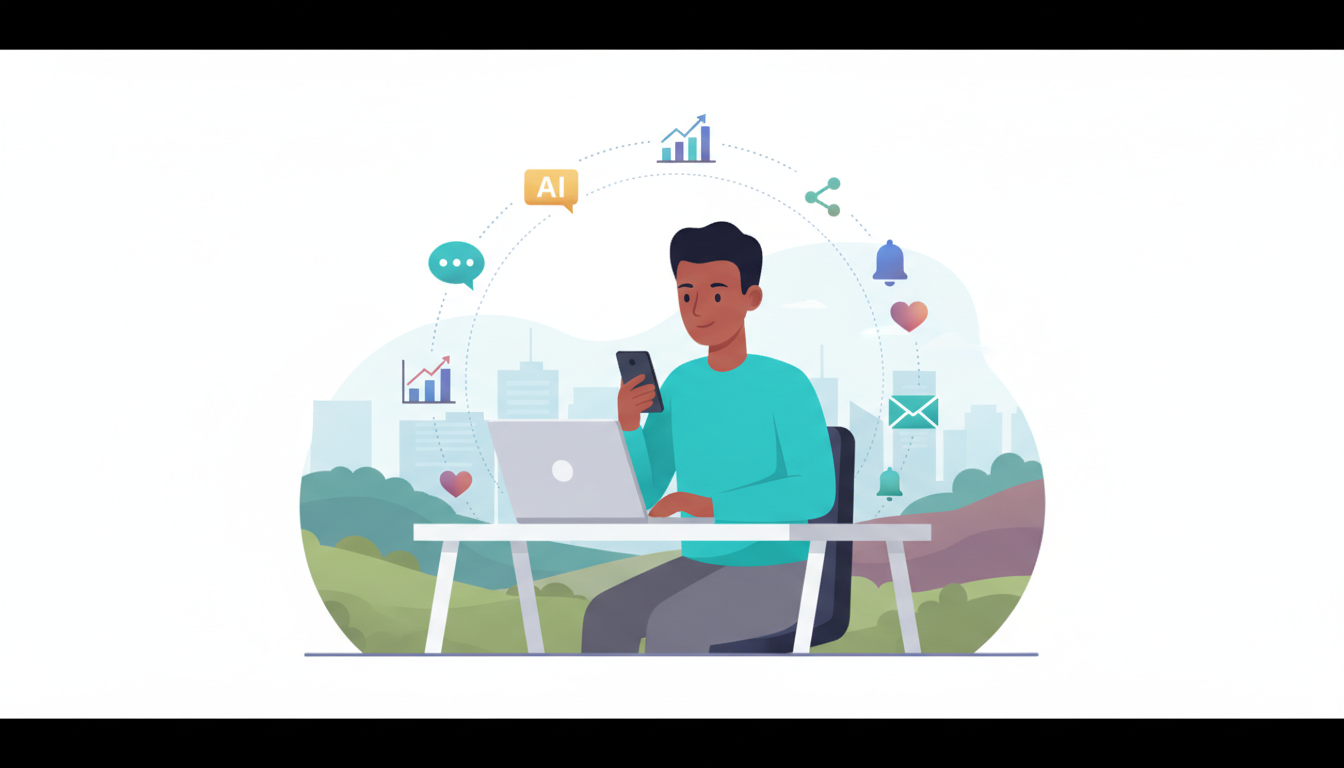Imagine this scenario: A tourist arrives in Kigali and searches “best coffee shop near Kigali Convention Centre.” Three businesses appear at the top of Google with their locations on a map. Your coffee shop isn’t one of them—despite being just 200 meters away and serving exceptional coffee.
You’ve just lost a customer. Not because your product isn’t good enough, but because your online presence is invisible.
This happens hundreds of times daily to Rwandan businesses. The painful truth? Your competitors aren’t necessarily better—they’re just more visible online. And in Rwanda’s rapidly digitalizing economy, where Vision 2050 is transforming the country into Africa’s digital hub, online visibility isn’t optional—it’s survival.
Here’s the encouraging news: Rwanda’s SEO landscape is still relatively uncompetitive. Unlike saturated markets in Europe or North America, Kigali businesses can achieve first-page rankings within 3-6 months with proper optimization. The opportunity window is wide open, but it won’t stay that way forever.
In this comprehensive guide, you’ll discover exactly how to leverage Local SEO to dominate Google searches in Rwanda. Whether you run a hotel in Nyarugenge, a restaurant in Kimihuruma, or an e-commerce store serving all of Kigali, these strategies will put you on the map—literally.
By the end of this article, you’ll understand the fundamentals of Local SEO and have a clear action plan to start implementing immediately. Let’s transform your online invisibility into unstoppable visibility.
What is Local SEO and Why It’s a Game-Changer for Rwandan Businesses
Understanding Local SEO
Local SEO helps you appear in search results when someone nearby searches for what you offer. It’s the practice of optimizing your online presence specifically for location-based searches like “restaurants in Kigali,” “hotels near Kigali Arena,” or “web design services Rwanda.”
When someone searches for these terms, Google displays results in a specific format: a map with three business listings at the top (called the Local Pack or Map Pack), followed by traditional organic results.
Why does this matter? These listings dominate visibility and get a large share of clicks—especially on mobile. In Rwanda, where over 90% of internet users access the web via smartphones, appearing in this Local Pack is pure gold.
The Unique Opportunity in Rwanda’s Digital Landscape
Rwanda presents an exceptional opportunity for early-adopting businesses. While digital transformation accelerates nationwide, most local businesses haven’t invested in proper SEO. This creates a first-mover advantage for those who act now.
Consider these compelling statistics:
- Nearly everyone (99%) has searched for information about a local business online
- 96% of people discover nearby businesses through online searches
- With local SEO, conversion rates can jump to an impressive 72%
- 75% of local business searches result in an offline visit within 24 hours
In Kigali’s growing economy—with thriving sectors in tourism, tech, hospitality, and e-commerce—being invisible online means leaving money on the table every single day.
Local SEO vs. Traditional SEO: What’s the Difference?
While both aim to improve your Google rankings, they operate differently:
Traditional SEO:
- Targets broad, national or international audiences
- Competes globally for keywords
- Focuses on overall website authority
- Example: “Best website design services”
Local SEO:
- Targets customers in specific geographic areas
- Competes locally with nearby businesses
- Emphasizes location-based factors
- Example: “Best website design services Kigali”
Regular SEO success might mean high organic traffic and sales from around the world, but the success of Local SEO translates to more foot traffic, local phone calls, and more customers from your community.
For most Rwandan SMEs—restaurants, hotels, retail stores, professional services—Local SEO delivers far better ROI because you’re targeting people who can actually visit your physical location or serve within your delivery radius.
💡 Fosia Tip: At Fosia Ltd, we specialize in Local SEO strategies specifically tailored to the Rwandan market. Our clients typically reach page one of Google for their primary local keywords within 3-6 months—transforming their visibility and customer acquisition. Discover how our web quality assurance and optimization services can elevate your online presence.
How Local SEO Actually Works: The Three Pillars
Understanding how Google decides which businesses to show in local search results is crucial. Three main factors determine your map pack rankings: Relevance, Distance, and Prominence.
1. Relevance: Matching Search Intent
Relevance measures how well your business matches what someone is searching for. If someone searches “Italian restaurant Kigali,” Google looks for businesses categorized as Italian restaurants in Kigali.
How to optimize for Relevance:
- Accurately categorize your business (we’ll cover this in detail)
- Use location-specific keywords in your website content
- Create detailed business descriptions
- Ensure your services/products are clearly listed
- Match your offerings to what customers actually search for
2. Distance: Proximity to the Searcher
Distance refers to how far your business is from the person searching. Google prioritizes nearby businesses—especially for mobile “near me” searches.
Important notes on Distance:
- You can’t change your physical location (obviously)
- But you can optimize for neighborhood-specific searches
- Mention specific Kigali districts: Kimihuruma, Nyarugenge, Kacyiru, Remera, Gasabo
- Create content about serving specific areas
- If you have multiple locations, create separate listings for each
3. Prominence: Authority and Reputation
Prominence measures how well-known and trusted your business is. This includes:
- Number and quality of online reviews
- Citations (mentions of your business across the web)
- Backlinks to your website
- Social media presence
- Brand mentions online
The top three factors for local SEO rankings are matching intent, proximity to the searcher, and authority.
Think of it this way: Google wants to show users the most relevant, closest, and most trusted businesses. Optimize all three factors, and you’ll dominate local search.
📍 Rwanda Example: A boutique hotel in Kimihuruma optimized all three pillars:
- Relevance: Updated their Google Business Profile with accurate categories (Boutique Hotel, Bed & Breakfast)
- Distance: Created content mentioning nearby landmarks (Kigali Convention Centre, Kigali Heights)
- Prominence: Gathered 35 five-star reviews and earned mentions in local tourism blogs
Result: They jumped from page 3 to the Local Pack (top 3) for “hotels near Kigali Convention Centre” within 4 months—increasing direct bookings by 180%.
Step 1: Claim and Optimize Your Google Business Profile
Google Business Profile is essential for your company to pop up in nearby customer search results and Google Maps. Your Google Business Profile (formerly Google My Business) is often the first impression potential customers get.
This is your single most important Local SEO action. Everything else builds on this foundation.
Why Google Business Profile Matters
Your Google Business Profile (GBP) powers:
- Your appearance in the Local Pack (map results)
- Your visibility on Google Maps
- The information panel that appears when people search your business name
- Customer reviews and ratings display
- Photos, posts, and updates
The number one ranking signal for small businesses is having a well-optimized local listing on GMB. Without it, you’re essentially invisible in local search—no matter how good your website is.
The 10 Essential Elements to Optimize
1. Business Name
- Use your actual, legal business name
- Don’t stuff keywords (“Best Restaurant Kigali” is not your business name)
- Be consistent with your website and signage
2. Business Category
- Primary Category: Most important—choose carefully
- Examples: Restaurant, Hotel, Coffee Shop, Web Design Agency
- Secondary Categories: Add up to 9 additional categories
- Be as specific as possible (e.g., “Italian Restaurant” not just “Restaurant”)
3. Business Address (NAP) NAP stands for Name, Address, Phone Number, and it needs to be exactly the same everywhere your business is listed online.
- Use your exact physical address
- Include district (e.g., “KG 15 Ave, Kimihuruma, Kigali”)
- For service-area businesses, you can hide your address and show service area instead
4. Phone Number
- Use a local Kigali number if possible
- Make it clickable (mobile users will call directly)
- Same number across all platforms
- Consider adding WhatsApp (extremely popular in Rwanda)
5. Website URL
- Link to your homepage or relevant landing page
- Ensure it works and loads quickly
- Use UTM parameters to track traffic from GBP
6. Business Hours
- Accurate opening and closing times
- Mark special hours (holidays, special events)
- Update immediately if hours change
- Consider adding “Open 24 hours” if applicable
7. Business Description (750 characters) This is prime real estate for keywords:
❌ Bad: “We are the best restaurant in Kigali offering quality food.”
✅ Good: “Welcome to [Restaurant Name], Kigali’s premier Italian restaurant in Kimihuruma. Since 2018, we’ve served authentic pasta, wood-fired pizzas, and traditional Italian wines in a warm, family-friendly atmosphere. Located just 5 minutes from Kigali Convention Centre, we’re perfect for business lunches, romantic dinners, and family celebrations. Open daily 11am-11pm. Delivery available via [delivery service]. Reservations: [phone].”
Key elements included:
- Location (Kigali, Kimihuruma)
- What you offer (specific dishes)
- Unique selling points (authentic, family-friendly)
- Nearby landmarks (Convention Centre)
- Use cases (business lunches, dinners)
- Practical info (hours, delivery)
8. Attributes Select all that apply:
- Accepts credit cards
- Outdoor seating
- Free WiFi
- Wheelchair accessible
- Parking available
- Delivery
- Takeout
- Mobile Money accepted (crucial in Rwanda!)
9. Photos (This is huge!) One of the most effective ways to boost your local SEO is by optimizing your Google Business Profile.
Upload high-quality images:
- Logo: Clear, professional (minimum 250x250px)
- Cover photo: Eye-catching hero image (minimum 1024x576px)
- Interior photos: Show your space (10+ photos)
- Exterior photos: Storefront, building, street view
- Product/service photos: What you sell or provide
- Team photos: Humanize your business
- Action photos: Customers enjoying your business
Best practices:
- Update photos monthly
- Use professional photography
- Show current offerings (no outdated menus, old products)
- Optimize file names (“kigali-italian-restaurant-interior.jpg” not “IMG_1234.jpg”)
10. Google Posts (The Secret Weapon) Most businesses ignore this—huge mistake. Google Posts appear directly in your Business Profile and boost engagement.
Post types:
- Updates: New menu items, renovations, announcements
- Events: Special evenings, live music, promotions
- Offers: Limited-time discounts, special deals
- Products: Showcase specific items
Posting frequency: 2-3 times per week Benefits: Increased visibility, engagement signals to Google, fresh content
💡 Fosia Tip: We manage Google Business Profiles for all our clients, ensuring continuous optimization and fresh content. This ongoing maintenance keeps them ranking high while competitors fall behind. Explore our digital marketing and content creation services to learn how we can help.
📍 Case Study: A Kigali boutique clothing store had a claimed but unoptimized GBP—no photos, incomplete description, no posts. After full optimization (professional photos, detailed description, weekly posts, complete attributes), their profile views increased 340% in 60 days. Store foot traffic grew 67%.
Step 2: Master Local Keyword Research
Understanding what terms people use when searching for your products or services locally is crucial for targeting the right audience.
Keywords are the bridge between what people search for and how they find your business. Get this wrong, and all your other SEO efforts are wasted.
💡 Fosia Tip: We conduct comprehensive keyword research for every client project, identifying high-opportunity keywords specific to their industry and location in Rwanda. This strategic foundation ensures every piece of content and optimization effort drives actual business results. Learn more about our SEO and digital marketing services.
Step 3: On-Page SEO Optimization for Local Businesses
Once you’ve identified your keywords, it’s time to strategically place them throughout your website. Once you know your keywords, it’s time to optimize your website.
Title Tags: Your Most Important On-Page Element
Title tags appear in search results and browser tabs. They’re critical for rankings.
Formula: [Primary Keyword] | [Secondary Benefit/Location] | [Brand Name]
❌ Bad: “Home – Restaurant”
✅ Good: “Best Italian Restaurant Kigali | Authentic Pasta & Pizza | Bella Italia”
Best practices:
- 50-60 characters maximum
- Primary keyword at the beginning
- Include location (Kigali, Rwanda)
- Unique for every page
- Compelling to click
Meta Descriptions: Your Sales Pitch
Meta descriptions don’t directly impact rankings, but they dramatically affect click-through rates.
Formula: [Action verb] + [Benefit] + [Keywords] + [Call-to-action]
✅ Example: “Experience authentic Italian cuisine in the heart of Kigali. Fresh pasta, wood-fired pizzas, extensive wine list. Reserve your table today—5 min from Kigali Convention Centre. Call [phone].”
Best practices:
- 150-160 characters
- Include primary keyword naturally
- Add location (Kigali, neighborhood)
- Clear call-to-action
- Mention unique selling points
Header Tags (H1, H2, H3): Structure Your Content
Headers organize your content and signal importance to Google.
H1 (One per page):
- Main page heading
- Include primary keyword
- Example: “Professional Web Design Services in Kigali, Rwanda”
H2 (Multiple per page):
- Main section headings
- Include keyword variations
- Examples:
- “Why Choose Our Kigali Web Design Agency”
- “Custom Website Development for Rwandan Businesses”
- “Affordable Web Design Packages in Rwanda”
H3 (Sub-sections):
- Break down H2 sections
- Long-tail keywords
- Examples:
- “E-commerce Websites for Kigali Retailers”
- “Mobile-Responsive Design for Rwanda Market”
Homepage Optimization
Your homepage should immediately tell visitors and Google:
- What you do (your service/product)
- Where you’re located (Kigali, specific district)
- Why choose you (USPs, benefits)
Service/Product Pages
Create dedicated pages for each major service or product category.
Structure:
- H1: [Service] in [Location]
- Opening paragraph: Service description + location + benefits
- H2 sections:
- “Our [Service] Process”
- “Why Choose Our [Service] in [Location]”
- “[Service] Pricing and Packages”
- “Frequently Asked Questions”
- Local elements:
- Client testimonials from Kigali businesses
- Case studies with Rwanda examples
- Locations you serve
- Local landmarks near you
Location Pages (If Serving Multiple Areas)
If you serve different districts in Kigali or cities across Rwanda, create location-specific pages.
Example: Web Design Agency serving all Kigali
Create pages:
- /web-design-kimihuruma
- /web-design-nyarugenge
- /web-design-remera
- /web-design-kacyiru
Each page includes:
- Unique content about that neighborhood
- Local landmarks and businesses
- Specific examples relevant to that area
- Testimonials from clients in that location
- Embedded Google Map of the area
⚠️ Warning: Don’t just duplicate content and change the location name—Google penalizes this. Each page must have substantial unique content (400+ words).
Schema Markup: Speak Google’s Language
Schema markup is code that helps Google understand your business information better.
Essential Schema types for local businesses:
- LocalBusiness: Basic business info
- Restaurant: Menu, cuisine, price range (if applicable)
- Hotel: Amenities, rooms, rates
- Organization: Company details, social profiles
Implementation:
- Use Google’s Structured Data Markup Helper
- Or plugins if using WordPress (Schema Pro, Yoast SEO)
- Test with Google’s Rich Results Test
💡 Fosia Tip: Our web development services include full technical SEO optimization, including schema markup implementation. We ensure your site speaks Google’s language fluently, giving you a ranking advantage over competitors. We also provide ongoing web quality assurance to maintain peak performance.
Conclusion: Your Local SEO Journey Starts Now
Congratulations! You’ve just learned the foundational pillars of Local SEO specifically tailored for the Rwandan market. Let’s recap the essential actions from Part 1:
✅ What We Covered:
- Understanding Local SEO — Why it’s crucial for Rwandan SMEs and how it works
- The Three Ranking Pillars — Relevance, Distance, and Prominence
- Google Business Profile — Your most powerful Local SEO tool
- Local Keyword Research — Finding keywords your customers actually use
- On-Page Optimization — Structuring your website for maximum visibility
The opportunity for Rwandan businesses in Local SEO has never been better. With Rwanda’s continued digital transformation under Vision 2050, early movers will capture market share that latecomers will struggle to reclaim.
Ready to Dominate Local Search in Kigali?
At Fosia Ltd, we’ve helped dozens of Rwandan businesses transform from invisible to unmissable on Google. Our comprehensive Local SEO services are specifically designed for the Rwanda market—we understand local consumer behavior, mobile-first needs, and the unique challenges of ranking in emerging digital markets.
Get Your Free SEO Consultation ($200 Value)
No obligations. No sales pressure. Just expert insights from Rwanda’s leading digital agency.




